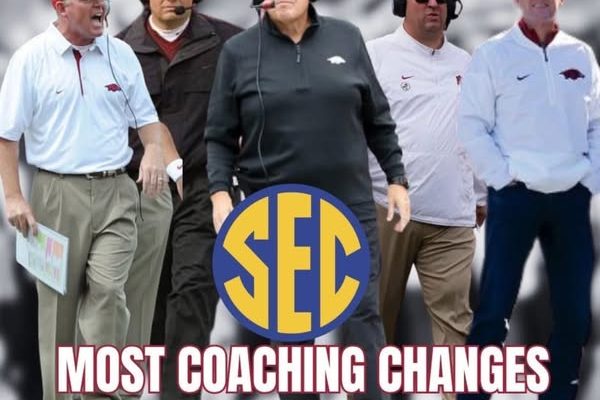For two decades, the Arkansas Razorbacks have been a program caught in perpetual motion — chasing stability, identity, and a formula that can bring back the glory days of consistency and competitiveness in the mighty Southeastern Conference. The revolving door of head coaches has turned Fayetteville into a cautionary tale about what happens when patience runs thin and long-term vision gives way to short-term panic. With the hire of their sixth head coach in just twenty years, the Razorbacks once again find themselves at the crossroads of hope and uncertainty, wondering whether this latest change will finally restore the pride of a fan base that has endured too many false dawns.
The SEC is a conference defined by power, money, and ruthless standards. Success isn’t optional — it’s expected, demanded, and enforced by the pressure of packed stadiums and massive television contracts. For programs like Alabama or Georgia, that expectation is met with championships and stability. For Arkansas, it has become a source of endless upheaval. Since the early 2000s, the Razorbacks have cycled through head coaches with alarming regularity, each one brought in as a savior and ushered out as a disappointment.
It all began with the end of the Houston Nutt era, a period that, in hindsight, may represent the last semblance of stability in Fayetteville. Nutt, who led the Razorbacks from 1998 to 2007, was the last coach to sustain a long-term tenure with consistent winning seasons and major bowl appearances. He brought Arkansas to multiple SEC Championship Games and made the program nationally relevant. Yet, even Nutt couldn’t escape the internal politics, fan pressure, and unrealistic expectations that have become synonymous with the Razorback brand. His departure, amid controversies and strained relationships within the program, opened the door to an era of chaos that has yet to truly end.
Bobby Petrino followed Nutt, bringing with him both offensive brilliance and personal baggage. At first, it seemed like Arkansas had struck gold. Petrino’s teams lit up the scoreboard, turning Fayetteville into a hub of offensive fireworks. In 2011, the Razorbacks won 11 games, finished top five in the nation, and appeared on the verge of joining the SEC elite. Yet the success was short-lived. Petrino’s infamous motorcycle accident and the scandal that followed led to his firing in 2012 — a stunning and sudden collapse of a program that had finally seemed to find its rhythm.
From there, the decline accelerated. John L. Smith was hired on an interim basis, and his tenure quickly became a disaster. Arkansas finished 4-8 in 2012, losing to teams they once dominated and exposing the deep cracks left by Petrino’s abrupt exit. Bret Bielema came next, a coach who arrived from Wisconsin with a reputation for toughness and a formula built around power football. At first, his hiring seemed like the right move — a culture builder who could bring stability to a program in need of direction. But Bielema’s tenure was marred by inconsistency. Despite moments of promise, including a few notable wins, Arkansas never made the leap forward. His teams struggled in key moments, blowing leads and losing close games that defined the frustration of the fan base. By 2017, his time was up.
Then came Chad Morris — a gamble that turned into one of the lowest points in program history. Hired from SMU with a reputation as an offensive innovator, Morris’s teams were unprepared, outmanned, and directionless. His Razorbacks went 4-18 overall and winless in the SEC, marking one of the darkest stretches in Arkansas football history. The fan base’s patience, already worn thin, reached its breaking point. Morris was gone after less than two full seasons, and the Razorbacks once again found themselves starting over.
When Sam Pittman took the job in 2019, the move was seen as a return to fundamentals — a hire rooted in culture and connection rather than flash and hype. Pittman, known for his authenticity and his background as an offensive line coach, instantly endeared himself to the Arkansas faithful. His early success, especially in the pandemic-shortened 2020 season, reignited belief. By 2021, Arkansas had won nine games, defeated Texas and Texas A&M, and appeared to have finally found a leader who understood what made Razorback football special.
But as quickly as it rose, the momentum faded. The following seasons exposed familiar problems — defensive breakdowns, close losses, and inconsistency at quarterback. Injuries, attrition, and the growing competitiveness of the SEC West made it hard for Pittman to sustain progress. By the end of 2024, the program once again found itself adrift, and the administration decided to move in a new direction. The result: Arkansas is now introducing its sixth head coach in just twenty years — a stunning turnover rate for a program once considered one of the conference’s most stable.
This constant instability has had far-reaching effects. Recruiting, the lifeblood of any SEC program, has suffered under the weight of turnover. Every new coach brings a different philosophy, a new system, and new promises to recruits who rarely see the same staff that initially recruited them. The inconsistency has also weakened Arkansas’s identity. Once known for its physicality and fierce competitiveness, the Razorbacks have struggled to define who they are on the field. Are they a spread team? A power-running program? A rebuilding underdog or a sleeping giant? Each coaching change resets the answer to that question, leaving players and fans alike searching for clarity.
Financially, the instability has been costly. Buyouts, contract settlements, and the constant expenses of new staff hires have drained millions from the athletic department. Every firing comes with a hefty price tag, and every new hire brings with it the promise of more spending — on facilities, assistants, and recruiting resources. For a program that doesn’t have the same financial muscle as Alabama or Texas A&M, those expenditures can cripple long-term planning.
Yet, beneath the frustration, there remains a persistent hope. Arkansas fans are among the most loyal and passionate in the SEC. The love for the Razorbacks runs deep through the Ozarks, and the desire to see the program reclaim its former glory is unwavering. Every new coach is greeted with optimism, every new season with renewed belief that this time might finally be different.
The question now is whether Arkansas can finally break the cycle. Success in the modern SEC requires more than just a good coach — it demands alignment between administration, boosters, players, and fans. It requires patience in an era where patience is almost extinct. The Razorbacks’ recent history shows that quick fixes don’t work. Every coaching change has brought a new philosophy but rarely lasting success.
What Arkansas truly needs is an identity — something that transcends the coach of the moment. The best programs in the SEC know who they are, no matter who wears the headset. Georgia plays elite defense and recruits ruthlessly. Alabama built its dynasty on process and discipline. LSU thrives on swagger and athleticism. Arkansas, meanwhile, has spent twenty years trying to rediscover itself, often changing direction before a vision could take root.
There are reasons for cautious optimism. The facilities at Arkansas are top-tier, among the best in the conference. The fan base remains deeply engaged, and the recruiting footprint has expanded thanks to modern NIL opportunities and improved visibility. Fayetteville itself has transformed into a vibrant college town with growing appeal to players and coaches alike. These are the building blocks of a successful program — but they need leadership that can harness them consistently.


